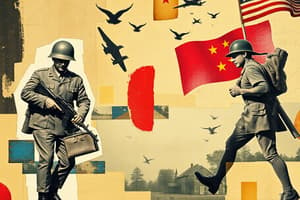Podcast
Questions and Answers
Which event effectively ended the Second World War?
Which event effectively ended the Second World War?
- Treaty of Versailles
- Signing of the League of Nations agreement
- Battle of Verdun
- Dropping of atomic bombs on Hiroshima and Nagasaki (correct)
What consequence of the Treaty of Versailles contributed to the rise of Adolf Hitler and Nazi Germany?
What consequence of the Treaty of Versailles contributed to the rise of Adolf Hitler and Nazi Germany?
- Imposition of harsh terms on Germany (correct)
- Recognition of Austria as an independent state
- Placement of heavy economic penalties on Japan
- Establishment of the League of Nations
Which factor led to the emergence of new superpowers like the United States and the USSR after the Second World War?
Which factor led to the emergence of new superpowers like the United States and the USSR after the Second World War?
- Introduction of chemical weapons in warfare
- Dropping of atomic bombs on Berlin
- Development of trench warfare tactics
- Total war concept and significant changes in geopolitical landscape (correct)
What major geopolitical event was established as a result of the Treaty of Versailles?
What major geopolitical event was established as a result of the Treaty of Versailles?
Which development transformed how armies fought during the world wars?
Which development transformed how armies fought during the world wars?
What international organization was established as a result of increased scrutiny of military actions during the world wars?
What international organization was established as a result of increased scrutiny of military actions during the world wars?
What triggered the First World War?
What triggered the First World War?
How many countries were involved in the Second World War?
How many countries were involved in the Second World War?
What political tensions fueled the Second World War?
What political tensions fueled the Second World War?
Which event marked the beginning of the Second World War?
Which event marked the beginning of the Second World War?
What lesson do the First and Second World Wars provide about international relations?
What lesson do the First and Second World Wars provide about international relations?
How many military personnel were involved in the First World War?
How many military personnel were involved in the First World War?
Flashcards are hidden until you start studying
Study Notes
History of World Wars
The history of the two major conflicts known as the First and Second World Wars have profoundly shaped our modern understanding of warfare and international relations. These wars were fought on multiple fronts across the globe, with millions of lives lost and entire countries changed forever by their consequences. The events leading up to these wars, the battles themselves, and the aftermath provide us with valuable lessons about the dangers of nationalism, militarism, and the escalations that can occur when nations fail to resolve disputes peacefully.
Origins of the Conflicts
Both the First and Second World Wars had complex historical origins. The First World War began in 1914 following the assassination of Archduke Franz Ferdinand of Austria-Hungary by a Serbian nationalist. This event triggered a series of alliances between European powers, which led to a global conflict involving over 70 million military personnel from more than 30 different nations.
The Second World War was even more far-reaching. It began in 1939 with Germany's invasion of Poland and involved over 100 million soldiers from 30 different countries. This conflict was fueled by political tensions between Germany, Italy, and Japan, who formed the Axis Powers, and the Allies, including Britain, France, the Soviet Union, and later the United States.
Major Battles and Events
Some of the most significant events during both the First and Second World Wars include the Battle of Verdun in 1916, which was one of the longest and deadliest battles in human history; the signing of the Treaty of Versailles in 1919, which established the League of Nations and placed heavy economic penalties upon Germany; and the dropping of atomic bombs by the United States on Hiroshima and Nagasaki in 1945, effectively ending the Second World War.
Consequences and Legacy
The consequences of the two world wars were immense. They resulted in massive loss of life, widespread destruction, and significant changes in geopolitical landscape. For instance, the Treaty of Versailles imposed harsh terms on Germany, contributing to its instability and subsequent rise of Adolf Hitler and Nazi Germany. The Second World War saw the emergence of new superpowers such as the United States and the USSR, and paved the way for the Cold War.
Moreover, the wars brought about fundamental shifts in thinking regarding warfare. Trench warfare, chemical weapons, and air raids transformed how armies fought, while the idea of total war demanded full commitment from every citizen in a nation's war effort. Additionally, the revelation of the extent of atrocities committed by some nations against civilians led to increased scrutiny of military actions and the development of international organizations such as the International Committee of the Red Cross and the United Nations, aimed at preventing future conflicts.
In summary, the history of the world wars is a tragic narrative filled with human suffering, technological advancements, and geopolitical transformations that continue to shape the world we live in today. Their legacy serves as a reminder of the horrors of warfare and the importance of international cooperation and peace.
Studying That Suits You
Use AI to generate personalized quizzes and flashcards to suit your learning preferences.




